The Science Behind Ayahuasca and Its Forgiveness Effects

What is Ayahuasca? An Overview of Its Origins
Ayahuasca is a powerful brew traditionally used in Amazonian cultures for spiritual healing. Made from the Banisteriopsis caapi vine and other plants, it combines the psychoactive compound DMT with monoamine oxidase inhibitors. This unique combination allows users to experience profound altered states of consciousness, often leading to insights about their lives and emotions.
Forgiveness is not an occasional act, it is a constant attitude.
The use of ayahuasca has gained popularity beyond the Amazon, attracting people seeking healing and personal growth. Many participants report transformative experiences that challenge their perceptions and open their minds to new possibilities. This cultural significance underlines the need to explore its effects, particularly regarding emotional healing and forgiveness.
Understanding ayahuasca's background sets the stage for delving into its psychological effects. The blend of tradition and modern interest highlights the brew's relevance in today's discussions about mental health and emotional well-being.
The Role of DMT in Ayahuasca Experiences
DMT, or dimethyltryptamine, is often called the 'spirit molecule' due to its intense, often mystical experiences. When ingested, it interacts with serotonin receptors in the brain, leading to vivid hallucinations and deep emotional revelations. This interaction can create a sense of connectedness to oneself and others, which is crucial for personal healing.

Research indicates that the intense experiences facilitated by DMT can help individuals confront unresolved emotions and traumas. Participants often describe feelings of empathy and understanding, which are essential components of forgiveness. By addressing these deeper issues, ayahuasca can pave the way for emotional release and healing.
Ayahuasca's Healing Powers
Ayahuasca facilitates emotional healing by allowing participants to confront suppressed feelings and gain insights into their personal experiences.
In this way, DMT's role in ayahuasca goes beyond mere entertainment; it serves as a catalyst for profound psychological shifts. Its effects can help individuals navigate their feelings towards others, ultimately fostering a sense of forgiveness that may have previously felt out of reach.
How Ayahuasca Facilitates Emotional Healing
Many who undergo ayahuasca ceremonies report significant emotional breakthroughs. The brew's psychoactive properties often allow individuals to access buried feelings that may have been suppressed for years. This process can be both cathartic and enlightening, as participants confront their past and gain a clearer understanding of their emotions.
The wound is the place where the Light enters you.
Ayahuasca ceremonies often take place in a supportive environment led by experienced facilitators. This setting not only enhances the experience but also provides a safe space for participants to explore their feelings. The communal aspect of these ceremonies can build a sense of connection that further supports emotional healing and forgiveness.
By guiding individuals through their emotional landscapes, ayahuasca can help cultivate self-compassion and empathy. This newfound understanding can be transformative, allowing individuals to let go of grudges and embrace forgiveness, both towards themselves and others.
Forgiveness: A Key Outcome of Ayahuasca Journeys
Forgiveness is often a prominent theme during ayahuasca experiences. Participants frequently report feelings of release, understanding, and reconciliation, both with themselves and those they feel wronged by. This process can lead to a renewed sense of peace and emotional clarity.
The transformative nature of ayahuasca allows individuals to view their past experiences from a different perspective. Many find that they can empathize with those who hurt them, which is a vital step in the forgiveness process. This shift in perspective often leads to a reduction in anger and resentment.
DMT's Role in Emotional Release
The psychoactive compound DMT in ayahuasca helps users experience profound emotional revelations, fostering empathy and forgiveness.
Ultimately, the journey through ayahuasca can serve as a powerful tool for fostering forgiveness. By confronting and processing deep emotional wounds, individuals can emerge with a greater sense of compassion and understanding, contributing to their overall emotional health.
Scientific Studies on Ayahuasca and Forgiveness
Recent studies have begun to explore the psychological benefits of ayahuasca, particularly its potential role in enhancing forgiveness. Research has shown that participants often report increased feelings of empathy and decreased levels of aggression after undergoing ayahuasca experiences. This suggests that the brew may help individuals process their emotions more constructively.
One study highlighted that participants who engaged in ayahuasca ceremonies demonstrated significant improvements in emotional regulation and interpersonal relationships. These findings indicate that ayahuasca can facilitate forgiveness, allowing individuals to let go of past grievances. This scientific backing adds credibility to the anecdotal reports surrounding ayahuasca's transformative effects.
While more research is needed to fully understand these mechanisms, the initial findings are promising. They suggest that ayahuasca could be a valuable tool for those seeking emotional healing and a path towards forgiveness.
Cultural Perspectives on Forgiveness and Ayahuasca
In many Indigenous cultures, forgiveness is viewed as a communal process, deeply intertwined with spiritual practices. Ayahuasca ceremonies are often seen as a means to connect with one's spiritual self and release negative emotions. This cultural perspective emphasizes the importance of community support in the forgiveness journey.
Participants in ayahuasca ceremonies often share their experiences with others, creating a sense of solidarity and understanding. This communal aspect can enhance the healing process, allowing individuals to feel less isolated in their struggles. Many find that discussing their experiences fosters a greater sense of forgiveness towards themselves and those who have wronged them.
Community and Forgiveness
Cultural perspectives emphasize that ayahuasca ceremonies promote communal support, enhancing the journey towards forgiveness and emotional healing.
The cultural significance of ayahuasca as a tool for forgiveness reinforces the idea that emotional healing is not just an individual endeavor. It highlights the importance of community, connection, and shared experiences in navigating the complex journey of forgiveness.
Considerations and Risks of Ayahuasca Use
While ayahuasca can offer profound insights and emotional healing, it is not without risks. The intense experiences can be overwhelming for some individuals, and those with certain mental health conditions may face heightened challenges. It’s essential to approach ayahuasca with caution and respect, ideally under the guidance of experienced facilitators.
Participants should also consider the legal status of ayahuasca in their country, as it varies widely. Researching and choosing reputable retreat centers is crucial to ensure a safe and supportive environment. Those interested in exploring ayahuasca should prioritize their physical and mental well-being throughout the process.

Ultimately, being informed about the potential risks and preparing adequately can enhance the ayahuasca experience. With the right precautions, individuals can embark on their journey towards forgiveness and emotional healing in a mindful and responsible manner.